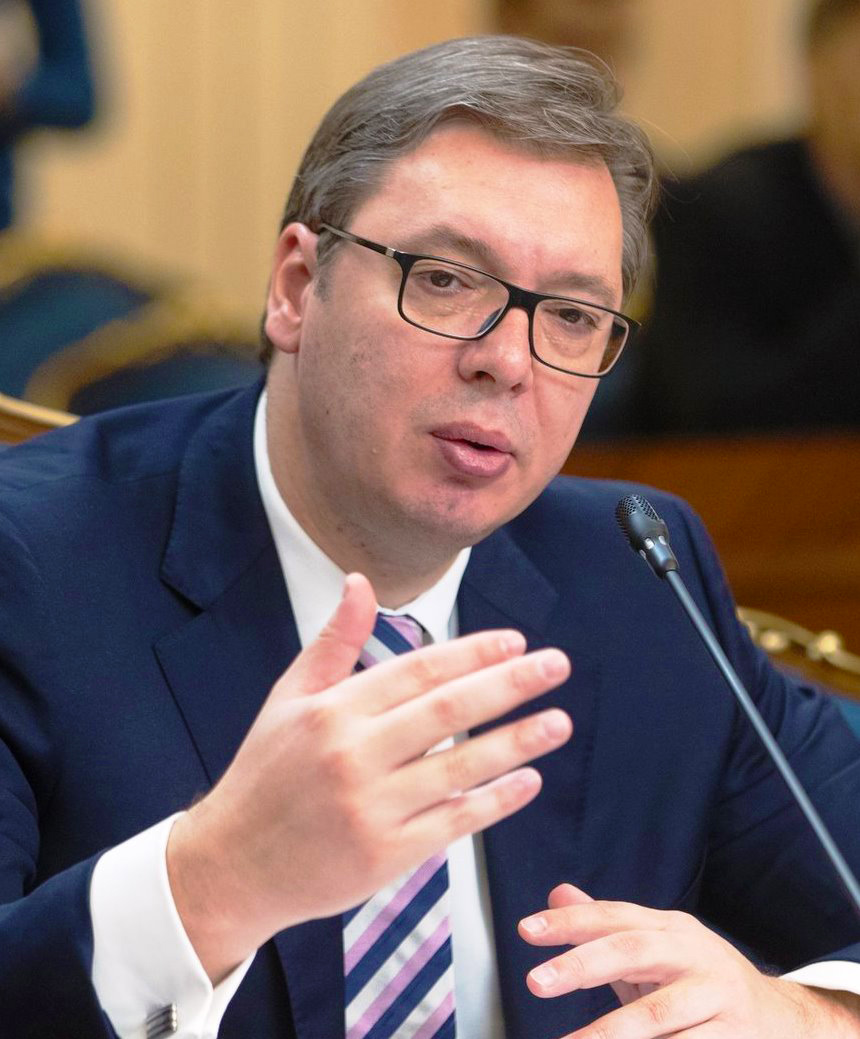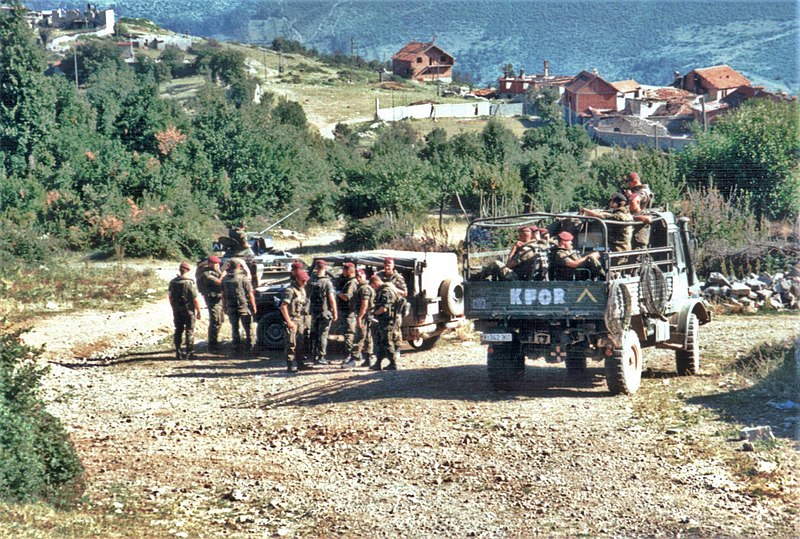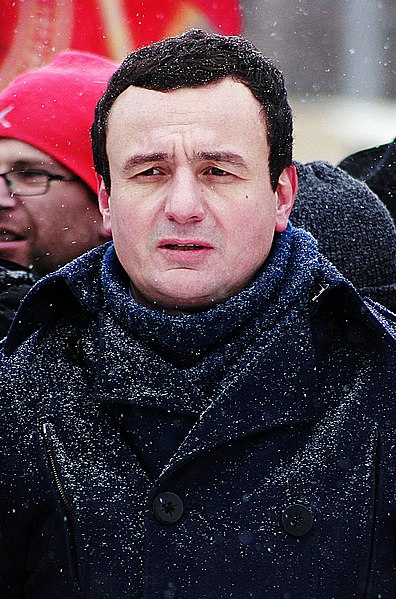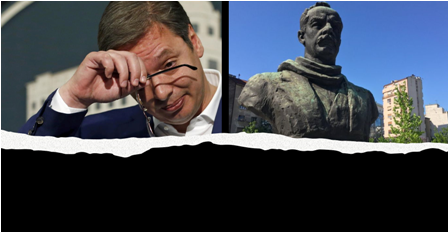For several months now, we have been bombarded with images about a supposedly imminent military escalation between Kosovo and Serbia. With the war in Ukraine as a backdrop, there is talk about old wounds potentially being reopened. However, in order to accurately assess the probability of such new conflicts in Southeast Europe, it is necessary to start with an analysis of the economic situation, and the interests of the ruling classes in the region, as well as the interests of imperialism. Note: this article was originally written in January 2023.
The Balkans in the hands of the imperialists
We will begin with the situation in Serbia. Besides Turkey, Serbia is the only EU candidate country that has not imposed sanctions on Russia. The main reason for refraining from sanctions lies in the fact that Serbia is completely dependent on Russian gas, as well as in the fact that Russia supports the Serbian position regarding Kosovo. Although we have seen attempts at diversification, such as relying on gas supplies from Azerbaijan, the current situation reveals a clear picture.
All large thermal power plants in Pančevo, Novi Sad and Zrenjanin depend on Russian gas. Even the gas pipeline infrastructure is owned by the Russian state energy company, Gazprom. Serbia receives Russian gas via the Turkstream pipeline, which extends through Bulgaria all the way to Serbia. Most of the Russian gas that reaches Serbia flows through the so-called “Balkan Tok,” which is an extension of the Turkstream pipeline. In the future, there is a possibility of acquiring parts of those reserves from elsewhere, but for now, there is no other option - the quantities offered by Azerbaijan are not enough.
 Economic crisis threatens the stability of the Aleksandar Vučić regime / Image: Пресс служба Совета Федерации Федерального Собрания РФ, Wikimedia Commons
Economic crisis threatens the stability of the Aleksandar Vučić regime / Image: Пресс служба Совета Федерации Федерального Собрания РФ, Wikimedia Commons
Imposing sanctions on Russia would therefore effectively mean risking a shortage of gas in Serbia, and thus an increase in the consumer price. All at a time when real estate prices and rents in Belgrade are the highest in the entire region. The cost of living in the Serbian capital is unbearable even for a large part of the middle layers in society, let alone for ordinary working-class families. A large number of young people and students are forced to return home to their parents. Many even leave the cities and return to small towns and villages. Together with the growth of inflation, all of this could threaten the stability of the Aleksandar Vučić regime.
Vučić himself, however, would very much like to step up cooperation with the European Union, as he demonstrated during the "Open Balkans" Summit in Belgrade, where he called on EU leaders to help him with the procurement of alternative energy supplies. Edi Rama, Prime Minister of Albania, vociferously agreed with Vučić, as reported by Radio Free Europe (Radio Slobodna Evropa):
"We remember well how, at the beginning of the pandemic, the countries of the Western Balkans were forced to turn to China, Russia, Turkey... because the European Union was only looking at itself".
He "announced that the leaders of Serbia, Macedonia and Albania will address Brussels in writing and that they would be ‘very satisfied’ if the leaders of the other three countries (Bosnia and Herzegovina, Montenegro, Kosovo) joined them."
The very fact that the European Union has not imposed sanctions on Serbia, even though it threatened to do so a few months ago, shows that the European rulers are well aware of the problem. They would very much like to put an end to Russian influence in the Balkans, but they are simply unable to supply the necessary gas. They suffer from the same problems in their own countries. They are certainly trying to pull Serbia closer towards Europe by other means, but this is also what Vučić has been trying to achieve. During the previous months, Vučić turned towards the European Union at every important moment.
When we look at foreign direct investment in Serbia, the reason why he is so politically oriented towards Western Europe becomes apparent: the European Union has been the largest and most important investor in Serbia for years. This trend has continued and intensified recently: in 2022 alone, the European Union invested more money in Serbia than China and Russia combined. In the period from January to June 2022, the EU invested more than 1.5 billion euros.
This does not mean that Chinese and Russian investments are irrelevant, in fact, they are just enough that Vučić can rely on them to some extent when bargaining with the European Union. But China's decision to invest less in the "Belt and Road" project in the region clearly reveals the main economic forces in the Balkans. Ever since the collapse of the former Yugoslavia, to which especially German and Austrian capital consciously contributed, Western European capital has been the dominant factor in this region.
In addition to these processes, we must keep in mind how the situation in the Balkans has developed since the ‘90s. Back then, the division of the new markets had only just begun. Today, the division has been completed. The states that were created on the soil of the former Yugoslavia went through a long process of restructuring, not only in terms of the relationship of ownership of the means of production, but also through the process of the emergence of new regional powers.
Serbia, as the country with the largest population, the largest domestic market, key natural resources as well as industrial regions, extending from the Vojvodina granary to the rich resources of iron, chromium, manganese and controlling an important part of the Danube, was an attractive candidate for various international investments. However, it took some time for a significant increase of investments, only after Vučić had come to power did they really flow in. The previous regime, although it declared itself pro-European, did not prove to be a loyal and effective partner of the European Union. Only Vučić managed to prepare a "good business climate" for the imperialists by destroying the public sector with austerity measures, giving huge subsidies to foreign investors, and offering cheap labour. On that basis, there was a big rise in investments. Serbia became a relevant country in the region, and the Serbian comprador bourgeoisie managed to take a step forward by serving foreign capital.
Serbia thus became an important factor in the region, and today openly has its own strong economic interests in establishing market cooperation with other countries in the region. In the countries of the "Open Balkan", i.e. In Macedonia and Albania, the free trade agreement has further cemented the predominance of Serbian goods. Even in Kosovo, a country that is not a member of the Open Balkan Initiative, the total value of Serbian imports increased by 27 percent in 2022 (almost 60 million euros). Even though economic activity between the two countries have been somewhat obstructed by recent conflicts, we do see a process of economic integration in the region. The situation is very different from what it was in the late ‘90s, the individual countries are much more connected to each other by way of economic and market ties.
New conflicts in Kosovo?
As a country, Kosovo is essentially a Western protectorate. Based on Western military pressure during the 1990s, it was finally able to declare its independence in 2008. Today, American imperialism still plays a key role in Kosovo, but even here the main investments now come from the European Union. The Kosovo Force (KFOR) is an armed “peacekeeping” force under the leadership of NATO – armed forces that effectively protect the interests of American and European capital. Although the institutions of northern Kosovo are closely connected with the institutions of Serbia, Kosovo as a country has its "own" institutions and its "own" state apparatus. We write "own" in scare quotes, because the state's monopoly of violence relies heavily on the imperialists.
 The Kosovo Force (KFOR) is an armed “peacekeeping” force under the leadership of NATO / Image: Nick Macdonald
The Kosovo Force (KFOR) is an armed “peacekeeping” force under the leadership of NATO / Image: Nick Macdonald
About 100,000 Serbs (6 percent of the population) live in Kosovo today. Half of them live in the north of Kosovo, while the other is in the south. Serbs in the north of Kosovo generally have their own institutions, which are independent from those of Kosovo. Moreover, they also enjoy certain benefits, which the Serbian bourgeoisie uses to create an incentive for people to stay in Kosovo.
The Serbian minority in Kosovo is an important instrument for the Serbian bourgeoisie to exert pressure on the Kosovar government. It does not care about the interests of ordinary people in Kosovo. It is only using the Serbian minority as a tool to influence the Kosovar government and to divert attention from the problems in Serbia. Whenever there is a political crisis in Serbia, whenever the economic situation makes life especially unbearable, some provocation by the Kosovo government is very welcome from the point of view of the Serbian ruling class.
Given the dominance of European capital in the region, however, an even greater rapprochement between Kosovo and Serbia is desirable. In both countries, European capital is the dominant factor. While the refusal of Kosovo to join the open Balkans this summer is an expression of authentic disagreement between official Belgrade and official Pristina, with Kosovar President Albin Kurti stating that he sees no perspective of joining, there still is a strong economic interest on the part of the Kosovo ruling class to participate in the cooperation:
"Due to the refusal to join the regional initiative ‘Open Balkans’, Kosovo loses out on freedom of movement of both people and goods, as well as a larger market for local producers, assesses Visar Imeri, executive director of the Institute for Social Policy ‘Musine Kokalari’ based in Pristina.”
In the context of all these events, at the end of last year, an issue rose to the surface that had already been developing for some time: that of licence plates. This question seems like something completely secondary, but in fact it reflects the nature of the whole process. People in the north of Kosovo have long used Serbian licence plates on their vehicles, and did not have to take them off when travelling from Kosovo to Serbia and vice versa. However, people with Kosovo licence plates could not enter Serbia so easily: they had to cover their Kosovo plates and add a Serbian tag. As a result, the Kosovo government finally ruled that Serbian drivers would also have to do the same in Kosovo and that Serbian licence plates would no longer be recognised.
Belgrade officialdom was outraged by this decision, there were mobilisations of the Serbian minority in the north and roadblocks. In response, the Kosovo government sent ROSU units to implement the measure of covering and tagging the licence plates. At the very moment when official Pristina wanted to start fining drivers with Serbian licence plates, the "good old voice" of conscience appeared: in the form of a call from the White House with a request to postpone the implementation of fines. The European Union loudly thanked their American partners for their cooperation. And when that new deadline finally passed, a new agreement was reached under the auspices of the European Union.
The situation was not resolved by this agreement - a long-term solution with the purpose of ‘normalising’ relations between Serbia and Kosovo is still pending. After reaching the agreement, the situation heated up again several times: there was a gathering of people in the north, barricades were put up once more and a Serbian boy and a young man were even shot at. These “escalations,” are not, however, the beginning of a new military conflict. On the contrary. All these minor conflicts reflect the process of approaching an agreement. Each side is trying to get as many concessions from the other as possible.
Official Belgrade, for one, is talking about the establishment of the "Community of Serbian Municipalities" (ZSO) in Kosovo, which in the meantime is even being openly supported by American imperialism! On Saturday, 21 January, the US envoy for the Western Balkans, Gabriel Escobar, announced that "Albin Kurti does not have to agree. Kosovo has agreed." On Friday, 20 January, even Vučić said that they were "ready" to accept the new agreement proposal.
 Kosovar President Albin Kurti has refused greater cooperation with Balkan countries / Image: AgronBeqiriPh, Wikimedia Commons
Kosovar President Albin Kurti has refused greater cooperation with Balkan countries / Image: AgronBeqiriPh, Wikimedia Commons
It is certainly difficult to assess what the final agreement will look like. What is certain, is that we are not talking about the solution of the Kosovo question, but rather about the process of rapprochement between the Kosovar and Serbian bourgeoisie, under the auspices of Western imperialism - at the expense of the workers of both countries. It is still a frozen conflict with its own dynamics, which can never be completely controlled by any side.
Still, the material interests are clear: the Serbian bourgeoisie wants the opportunity to influence the Kosovo government directly by establishing the ZSO. Practice must show what an agreement will really look like, but a strong instrument of direct rule would be much better for the Serbian bourgeoisie than regular barricades or threats. President Kurti, of course, does not want the ZSO to be established.
Yet when we look at the economic interests, the interests of the big imperialist groups and the general situation in the region, the question is not if an agreement will be reached, but only when. Only on the basis of an agreement is the economic integration of Kosovo and the additional integration of Serbia possible. Both countries are in the sphere of influence of American and European capital, and the agreement under the tutelage of the European Union will reveal the servile policy of the Serbian and Kosovo ruling classes.
As for the Serbs in Kosovo, as long as they are only pawns in the game of the Serbian bourgeoisie their material position will not improve at all. The Serbian List, the largest Serbian party in Kosovo, is nothing more than an instrument of controlling the north of Kosovo by the Serbian Progressive Party. Serbs in Kosovo have already understood this to some extent, as shown by the recent protests on 8 January in front of the building of the Serbian List in North Mitrovica, with slogans such as "Vučić, Kosmet doesn’t want you!" “You betrayed us!” “We don't even want your ‘ZSO’!” “You sold us out!" We have to say that this slogan remains within the framework of Serbian nationalism and can easily be developed into: “we don't want only ZSO, we want all of Kosovo, because Kosovo is Serbia”. But it is still remarkable that this group insists on peace and cooperation with the Albanians, and addresses Kurti much more than Vučić.
As far as the Albanians in Kosovo are concerned, we, as Marxists, support their right to self-determination, we see the claims of the Serbian bourgeoisie for dominance over Kosovo, and we openly say that no agreement will bring a solution to the national question. The agreement with Serbia only means that the Serbian bourgeoisie will join the American and European bourgeoisies in dictating the course of the country.
The basic economic problems in Serbia and Kosovo are the same. Both countries are dominated by imperialist capital. The bourgeois of both countries sell “their” cheap labour to the imperialists. Economic development is indeed blocked by the fragmentation of small countries. Rising prices, unbearable costs of living, the destruction of all old social achievements from Yugoslavia, all these phenomena are identical in Serbia and Kosovo.
The workers of both countries have the same problems, suffer from the same difficulties, and thus have the same interest in fighting against the domination of imperialism and the domestic bourgeoisies that implements their policies. Putting an end to price increases, overcoming borders, creating good living conditions, economically developing the Balkans, rebuilding the industry after the destruction during the wars of the ‘90s (the largest mine in Kosovo has not been rebuilt to this day), using natural resources in the interest of the majority of society, solving the national question, all this is possible. But only on the basis of taking the means of production into the hands of the working class and overcoming the nation state - in a Socialist Balkan Federation. Only within the framework of socialism is it possible to solve all these problems. Dimitrije Tucović painted the vision of such a Balkan federation more than 100 years ago:
“The Balkans without small states and artificially drawn borders, without fratricidal wars, freed from the rule of the big European capitalists, a free and independent, united Balkan republic, a developed Balkan, at a high level of cultural, technical and scientific development, and a Balkan that would not belong to the rule of kings, but only to the people, to socialism." (Dimitrije Tucović (1975): Sabrana Dela, 2. 426-430. Beograd: "Rad".)

